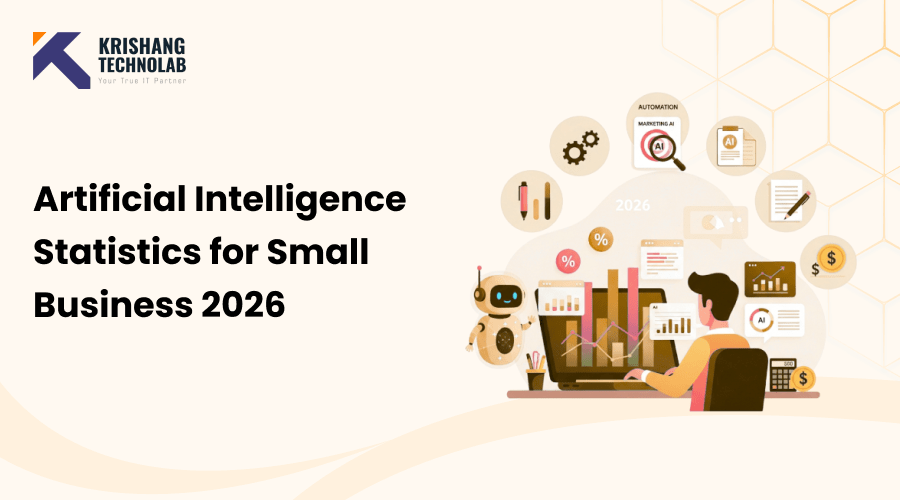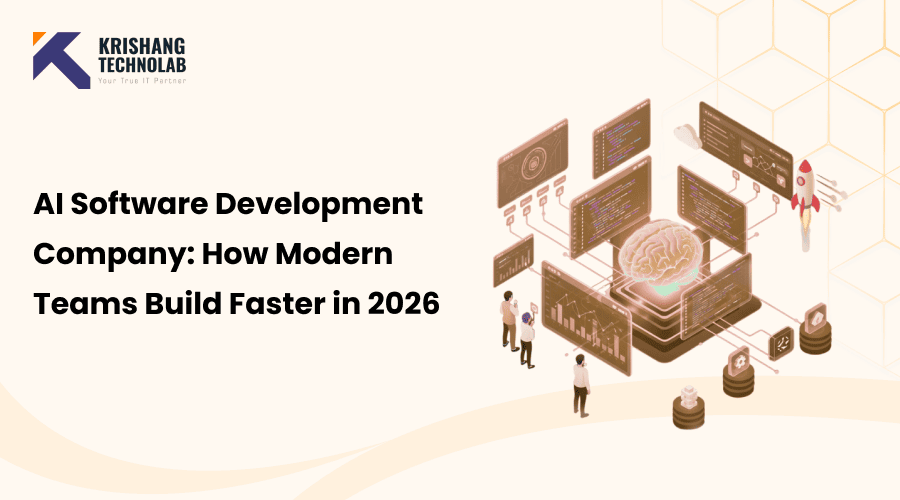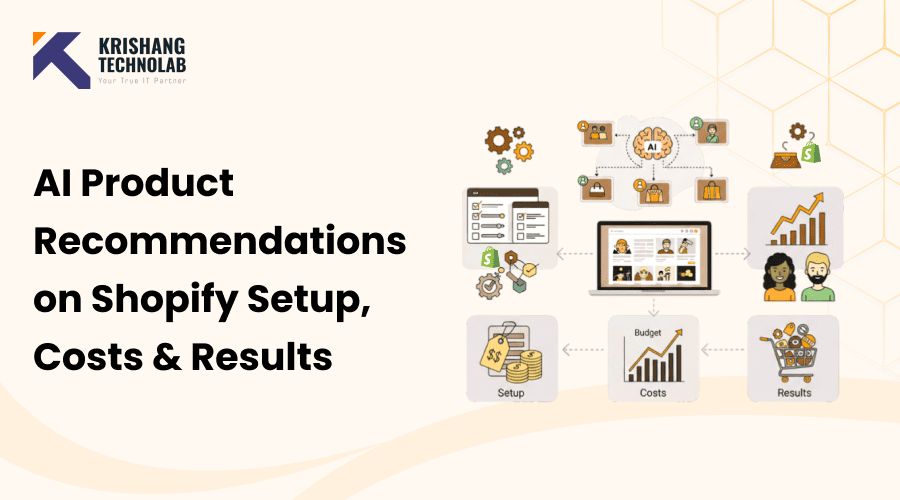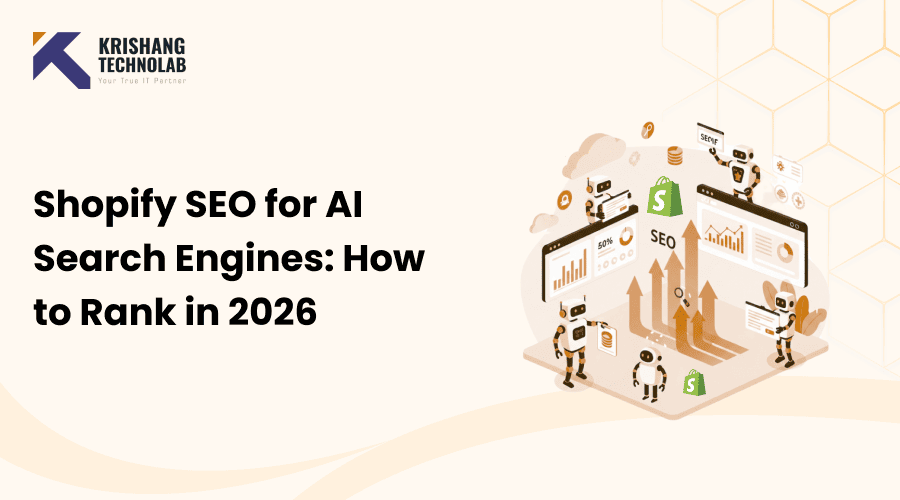Quick Overview:This blog examines key Artificial Intelligence Statistics and reveals key AI adoption trends for small businesses in 2026, showing growth opportunities, productivity gains, ROI, and industry-level changes, revealing how AI is changing the way business is operating with more effectiveness and improved flexibility and increasing their competitive presence.
Artificial intelligence is leading a major evolution in the way small businesses function in 2026. From marketing to customer service to financial automation, AI is no longer for only large corporations – it is a new omnipresent resource for entrepreneurs and local businesses everywhere. As business owners seek reliable Artificial Intelligence statistics for small business 2026, we are seeing rapid growth in tools that optimize how small businesses use Artificial Intelligence in 2026, AI-driven workflow automation, and AI tools that help small businesses grow.
Small businesses today are already using Artificial Intelligence to save time, reduce expense, improve decision analytics, and obtain a competitive advantage. This blog summarizes new statistics, insights, adoption patterns, and real impacts of generative AI development in 2026 – to clarify exactly where the software is headed.
Artificial Intelligence Statistics 2025–2026
The worldwide artificial intelligence (AI) market will continue its explosive growth between 2025-2026, as organizations globally adopt artificial intelligence into operational activities including marketing, automation, product development, analytics and customer experience. By embedding AI into operational functions, businesses report unprecedented productivity results, efficiency strides, and revenue increases, as AI becomes a principal driver of digital transformation.
Below are the most important AI statistics for 2025–2026.
Global AI Market Growth
- AI is estimated to reach $360–$420 billion by 2026, fueled by the ongoing adoption of automation, cloud AI, and generative AI.
- Global AI is anticipated to grow at a 29-37% CAGR from 2025 to 2032, one of the fastest-growing technology sectors on a global basis.
- Global revenue for generative AI will be $7.78B (2024) and is projected to rise to $18-22B in 2025, and to $30-40B in 2026.
- The global AI software market reached $94.4 billion in 2024 and is expected to significantly grow, with a projection of $126 billion in 2025 and $150–165 billion in 2026.
- Global AI chip revenue growing at 30–35% CAGR should go above $83 billion by 2027.
- The wearable Artificial Intelligence market (smartwatches, smart eyewear, smart audio, etc.) is projected to be more than $180 billion by 2025 and will continue thereafter.
- The natural language processing market will grow from $37 billion in 2024 to $45–52 billion by 2026.
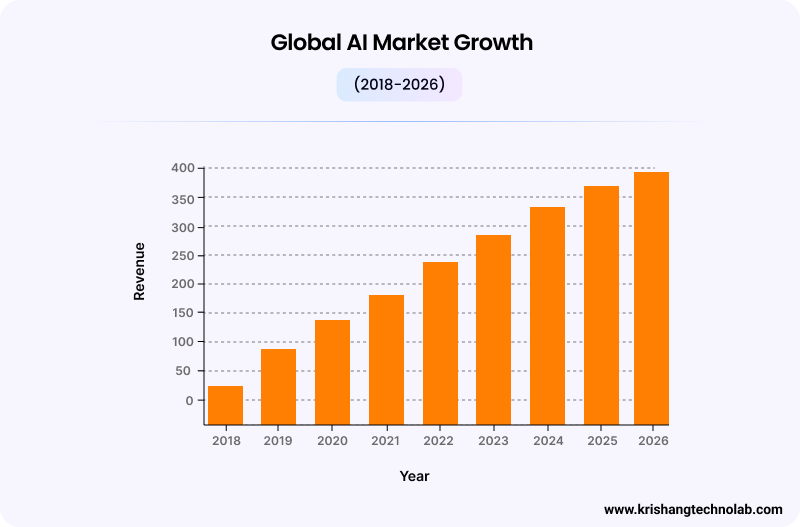
AI Adoption Among Businesses and the Global Workforce
- 96% of companies that are hiring in 2025 said that candidates with AI skills have an advantage.
- Almost 80% of global businesses plan to boost their investment in AI by 2026.
- Near 100 million people are expected to be working in AI and AI-related fields by 2025.
- Almost half of organizations across the globe feature AI in at least 1 business function, with predictions for more than 60% by 2026.
- 83% of corporate executives see AI technology as essential for being competitive on a world stage and #1 in their strategic priorities.
- 85% of B2B and B2C marketers believe generative artificial intelligence is altering content production and the customer experience.
- 70%+ of businesses should start leveraging GenAI for product development, operations, and marketing by 2026.
- The number of AI-enabled voice assistants will hit 8 billion+ devices globally, exceeding the world’s population.
- AI adoption globally has more than tripled since 2015, with continued acceleration rates in 2025–2026.
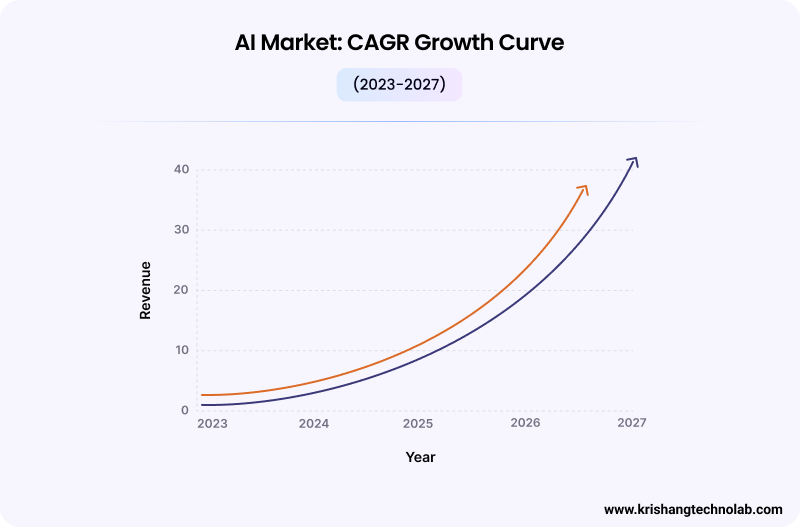
Productivity Gains and Industry-Specific AI Impact
- A business using AI should expect anywhere from 25–55% productivity increases depending on the industry and level of automation.
- Businesses can expect to yield about $3.50–$4.00 for every dollar spent on AI solutions, on average.
- 87% of retail executives believe that AI will be embedded into the retail operation by 2025–2026.
- AI-enabled business operations are thought to deliver around $140–160 billion in global revenue by 2026.
- AI-powered recommendation systems are still providing returns in dramatic fashion; Netflix produced a reported $1 billion impact from its recommendation engine.
Artificial Intelligence Adoption Statistics
By the time of 2025–2026, AI will expand beyond large organizations supporting small and medium businesses streamline operations, reduce costs, and improve customer experience. Around the world, AI is changing workflows, increasing speed to decision-making, and improving performance, which will continue to expand rapidly even more.
Key AI Adoption Insights for 2026
- By 2026, 70–90% of businesses worldwide will use at least one AI tool.
- 63% of companies acknowledge using AI on a daily basis, with 89% having at least one employee using AI every day.
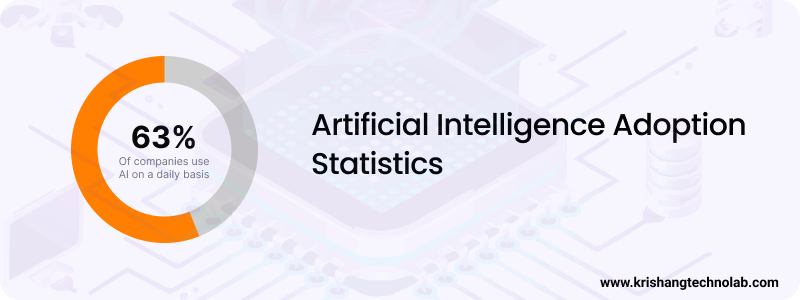
- AI users save between 20–120 hours per employee each year just on automating repetitive tasks.
- 66% of organizations document savings between $500 – $2,000 per month through AI solutions.
- 40–45% of small and medium businesses use generative AI for enhanced marketing, content creation, and improved customer service.
- 80–85% of companies state that AI improves employee efficiency, not as a replacement.
- 78–83% of business executives rank AI technology as necessary to remain competitive by 2026.
- Adoption is highest in retail, healthcare, real estate, e-commerce, finance, and other traditional professional services.
- 62% of organizations apply AI for data analysis, while 55% apply AI to generate content.
- 46% of businesses apply AI for customer engagement and 7-10% apply AI to automate finance, accounting and compliance.
- 57% of firms in finance indicated they apply AI to help inform their strategy while managing risk and service operations.
- Organizations in manufacturing, service operations, and HR indicated an AI usage of 11-25% to drive efficiencies and to automate workflows.
- Real estate firms have seen improvements in valuation accuracy rates by up to 20%, and the healthcare AI market will likely grow to $188 billion globally, by 2030.
- Adoption of cloud technology, AI-enabled cyber security, and high-speed connectivity, each contribute to the ability for firms to easily embrace AI and grow their business.
By adopting AI early, businesses gain efficiencies and increased smarter insights while leveraging their advantage in improving competitiveness in the fast-paced, quickly evolving global market.
Key Artificial Intelligence Statistics for Small Businesses in 2026
The increasing popularity of artificial intelligence in small business is more than a moment in the spotlight; it’s a measurable transition. The latest data points to how quickly AI is becoming an important part of day-to-day operations, marketing, customer service, and finance – all business functions. These Artificial Intelligence statistics for small businesses in 2026 showcase the most essential information that owners must be smart about.
Top Small Business Artificial Intelligence Statistics to Know in 2026
- 77% of small businesses are using at least one AI tool, up from just over half just three years ago.
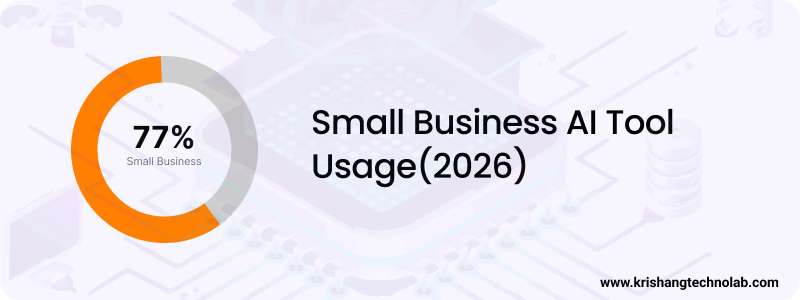
- Businesses report saving an average of 114 hours per employee per year through harnessing AI-powered automation.
- The average small business earns $3.70 for every $1 invested in AI, making it one of the highest technology investments available.
- More than 80% of AI-using SMBs believe artificial intelligence has added to, not taken away from, workforce expansion efforts.
- 40%+ of small businesses are even using generative AI tools for marketing, content creation, and customer service.
- 78% of small business owners believe AI is necessary to compete in 2026.
- Adoption of AI has accelerated the most in retail, healthcare, real estate, e-commerce, and professional services.
The data indicates that AI adoption is being realized at an accelerated pace, and for small businesses, artificial intelligence provides real, measurable benefits of using automation and smart technology.
Artificial Intelligence Adoption Among Small Businesses
The adoption of AI by small businesses has rapidly increased, with reports indicating that adoption rates range between 58% to more than 90%. Businesses have adopted AI partly because of free and low-cost AI tools available to them, and they are also resourceful, and AI gives small businesses efficiencies and value.
One of the most common applications is data analysis, along with content creation, such as developing advertising copy, and customer engagement. Once small business owners saw how much time and money they could save each month, it was much easier to embrace AI. Many felt they were benefiting from AI almost immediately.
Key Adoption Statistics for Small Businesses
- Rapid increase: The usage of AI in small businesses has dramatically increased over the past few years. Reports show that more than 90% of small businesses use at least one AI tool, a significant rise from the fact that over 60% were not using AI before. Another report highlighted a growth of AI adoption among small businesses from 23% to 58%.
- High adoption rate: According to surveys, 63% of small businesses use AI on a daily basis, and about 89% of small businesses have at least one employee actively using AI.
- Productivity and savings: There are tangible benefits of using AI. Also, as data indicate, 74% of AI users have reported improvements in productivity. For example, 58% of users reported saving over 20 hours a month, and 66% of users reported cost savings of between $500 and $2,000 a month.
Most Common AI Uses in Small Businesses
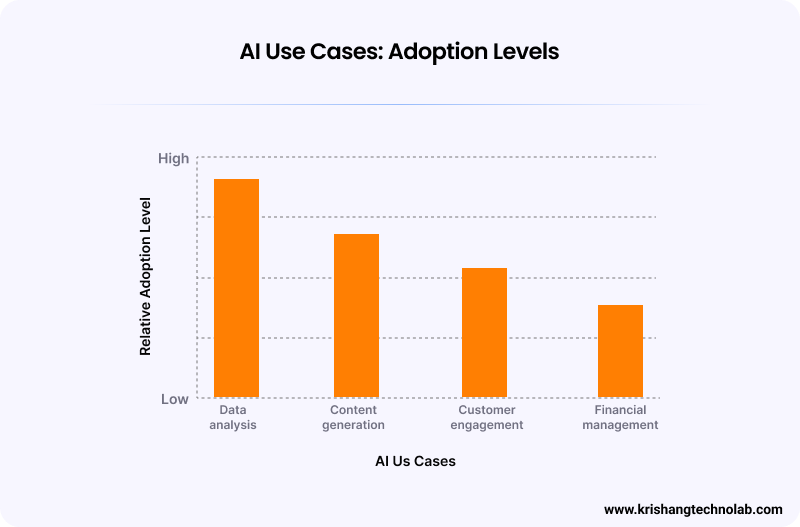
- Data analysis: 62% of small enterprises implement AI to analyze data.
- Content generation: 55% of small enterprises utilize AI to produce content.
- Customer engagement: 46% of small enterprises employ AI-enabled technology, such as chatbots, to engage customers.
- Financial management: 7% of small enterprise owners employ AI-enabled accounting and payroll tools to automate processes like invoice processing and expense tracking.
The AI-Driven Future of Small Businesses
From 2026-30, artificial intelligence will become an integral operating component of small business operations. AI will change how SMBs produce content, interact with customers, and manage day-to-day operations. For example, generative AI will create marketing and promotional materials in an instant, and autonomous AI agents, likely managed by AI consulting services, will oversee labor-intensive workflows such as returns, inventory checks, and follow-ups.
AI will also become increasingly specialized. Vertical AI tools will offer smarter automation specific to sectors, e.g., retail and financial services.
Key advantages include:
- Faster and lower-cost content creation
- Automated operational tasks
- Smarter, personalized customer experiences
Small businesses that utilize AI first will gain speed and efficiency and a strong competitive edge.
Conclusion
Artificial Intelligence is advancing rapidly and reshaping how small businesses do business. It allows them not only to do business smarter, faster, and more competitively, but also to automate repetitive processes, manage customer engagement, and facilitate more enriched data-driven decision making. Only big business had real access to these functions previously.
Krishang Technolab provides actionable and scalable AI development services for small businesses looking to drive productivity and growth. With the right approach and applications of AI, the small business will be able to enhance operational efficiency, improve customer experience, pinpoint opportunities for new innovation, and achieve sustainability.
Frequently Asked Questions
What is AI for small business and why is it important in 2026?
When we talk about Artificial Intelligence for small businesses, we usually refer to software tools that can automate repetitive tasks, analyze data, create content, or interact with customers. In 2026, small businesses will benefit from AI since they can take advantage of AI to save time, reduce costs, enhance decision-making, and be more competitive with larger companies.
What are the common AI use cases for small businesses in 2026?
Small businesses use AI in many areas, such as:
- Generative AI for content creation and marketing.
- Chatbots and virtual agents or assistants for customer service.
- Predictive analytics to help with sales forecasting and business or financial planning.
- Automation for invoicing, scheduling, and routine operations.
What are the ROI and cost‑benefits of investing in AI for SMBs?
Many small businesses are experiencing a strong return on their investment (ROI) for their AI implementation. For every dollar invested, small businesses report saved time or revenue several times their investment. Overall, Artificial Intelligence is being implemented to minimize labor, minimize errors, and thereby enable employees to focus on higher-value activities.
What AI adoption challenges do small businesses face in 2026?
Key challenges include:
- Financial constraints: The initial cost of the AI tool, subscription fees.
- Lack of technical expertise: Not having in-house AI specialists to assist.
- Poor data quality: Data needs to be consistent and appropriately limited in order for AI to be effective.
- Integration with legacy systems: Could still be using older software that doesn’t allow for new AI tools.
- Security and privacy concerns: Protecting your customer data is paramount.
How can small businesses choose the right AI tool for their business needs?
When selecting AI tools, SMBs should:
- Evaluate tools for specific business functions (marketing, support, operations, etc).
- Assess costs; subscription models, usage-based pricing, things like that.
- Look for functionality or ease-of-use; especially for non-technical users.
- Evaluate data security, privacy policy and compliance features.
- Start at a smaller level (pilot project) to see if it provides enough ROI to grow.
What are the ethical and data privacy considerations when using AI in small businesses?
Ethical and data concerns include:
- The customer data being stored is being used securely.
- Avoid biased or unfair decision-making using AI.
- Transparency from the company to customers when AI is being used (for example, chatbots).
- Regulatory and legal guidelines to protect data and consumer rights.
Sources: BusinessWireAI, FinancialContentAI, GrandViewAI, GuruFocusAI, LaserFocusSurvey, StatistaAI, McKinsey
